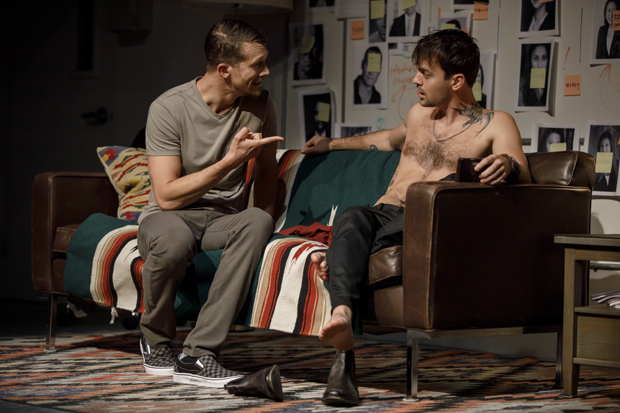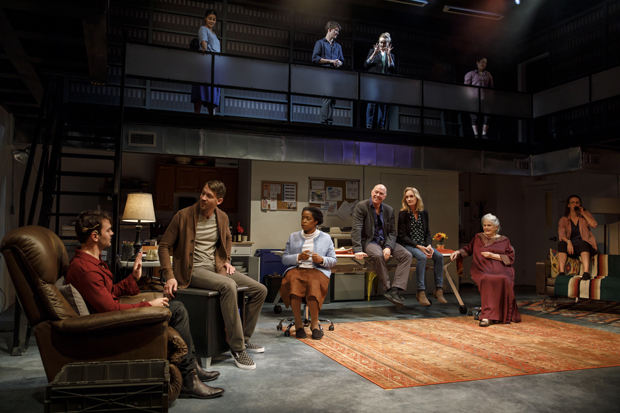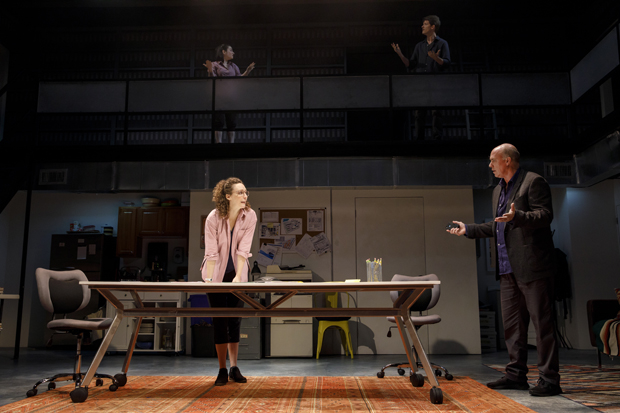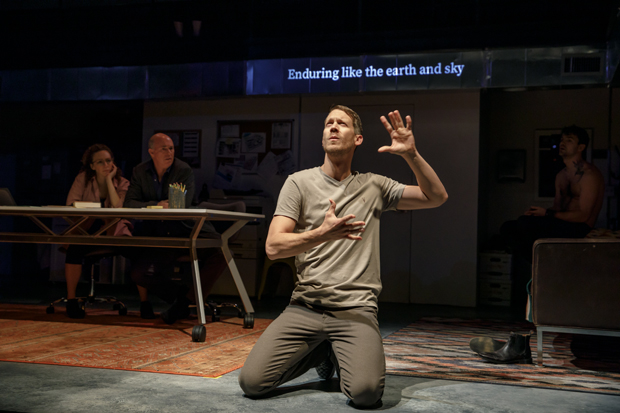A Modern Book of Job in I Was Most Alive With You
Craig Lucas pens a new drama about faith and loss.

(© Joan Marcus)
The standard opening salvo for Sunday school atheists goes, If God exists, why does he allow bad things to happen to good people? Of course, the Bible has an entire book dedicated to the answer. The Book of Job tells the story of a pious man blessed with wealth and happiness until God ruins him in order to prove a point: God's will is none of your business, and you're helpless to resist his awesome power. That may very well have satisfied the vast majority of the Abrahamic faithful throughout history, living in subsistence poverty and awaiting death's sweet release. But how does it fly for rich Americans, raised in the similarly dubious myth that they have control over their own destinies? Craig Lucas shows us in his newest drama, I Was Most Alive With You, a sensitive synthesis of ancient wisdom and modern sensibilities, now at Playwrights Horizons.
Lucas (Prelude to a Kiss, Reckless) smartly sets his tale around a big mixed family of Californians, so that even the most secular characters cling to some irrational devotion: For recovering drug addict Ash (Michael Gaston), it is the "higher power" of the 12-step program. Ash's Deaf son, Knox (Russell Harvard), admits that his God was booze before he became sober. Knox's sexy new boyfriend, Farhad (broodingly handsome Tad Cooley), is a Muslim apostate and active drug user who currently worships at the altar of Grand Theft Auto. Knox has faith that he can save him without compromising his own sobriety.

(© Joan Marcus)
The family gathers for Thanksgiving 2009 at the home of Carla (Lois Smith), Ash's Jewish convert mother who also produces the television series Ash writes with his creative partner (but maybe more) Astrid (Marianna Bassham). The presence of Ash's ex-wife, a sharp-tongued WASP ironically named Pleasant (Lisa Emery), augurs explosive revelations (the dessert course of all memorable Thanksgiving dinners). And sure enough, we soon learn that Carla invested most of the family money in a certain Ponzi scheme run by you-know-who (like Lord Voldemort, Bernie Madoff's name is apparently not to be uttered aloud).
Things get worse from there, although Lucas leaves room to doubt whether these events are the result of a malevolent God or personal choices. He also wisely gives us some perspective in the form of Mariama (an exceedingly sympathetic Gameela Wright), a nice Jehovah's Witness whose son is on death row for multiple homicide. Yes, Ash's family is going through a rough patch, but things could be much worse. In an effort to hold onto their health insurance, Ash and Astrid frantically write a screenplay based on the Book of Job and their own personal travails, and this serves as a frame for the play. The result is a drama that is about as messy as real life, but infinitely more interesting to watch.
Director Tyne Rafaeli's sleekly staged production reels us in and keeps us hooked. Annie Wiegand's practical and evocative lighting helps to create space in Arnulfo Maldonado's specific-yet-flexible set, which is always Ash and Astrid's writing studio, but is also a hundred other places. Jane Shaw's sound design guides our emotions with a series of uneasy adagios between scenes, sustaining us in a state of dread.

(© Joan Marcus)
Rafaeli has collaborated with Lucas and sign language director Sabrina Dennison to make the production completely accessible to both hearing and Deaf audiences: A shadow cast of actors signs the script from a mezzanine on the set, literally creating an entirely new level in an already multilayered play (David C. Woolard cleverly costumes the shadow cast to echo their downstairs correspondents without duplicating them). Dennison has choreographed this interplay with impressive synchronization. More thrillingly, the stage action on the lower level portrays the utilitarian mixture of speech and ASL (American Sign Language) through which Deaf and hearing people actually communicate every day.
Of course, it is up to hearing people to make the extra effort and learn ASL, which is actually a lot easier than reading lips. A subplot involves Pleasant's stalwart unwillingness to learn and the events that humble her into relenting for the sake of her son (Emery delivers a performance that is both funny and moving).

(© Joan Marcus)
The beating heart of I Was Most Alive With You is Harvard, who gives one of the most electric performances of the year. Through sign and speech, he conveys moments of transcendent joy and darkest despair, all frighteningly real. Far more relatable than the pedestal-ready Job, his response to misfortune isn't implacable faith, but perfectly human doubt. Sometimes the most graceful response to the world is admitting how much about it you don't know.










